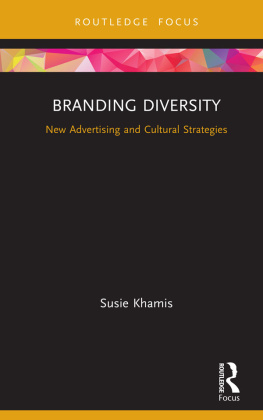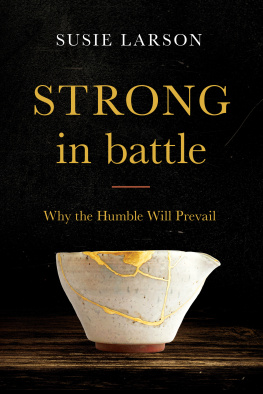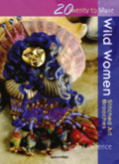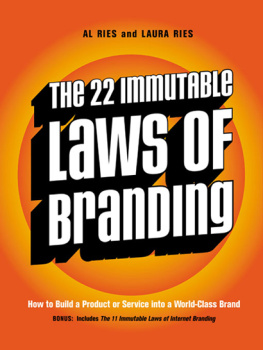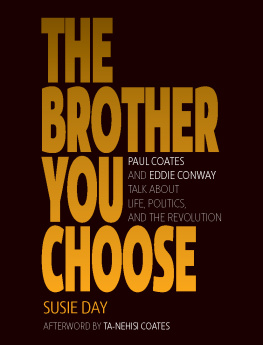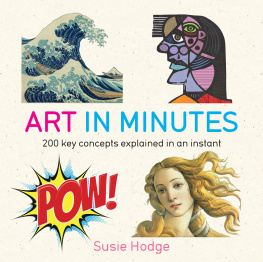Branding Diversity
Branding Diversity considers how brands both reflect and affect contemporary discussions of cultural diversity.
Advancing an innovative, critical perspective on advertising, the book challenges the latent assumption that advertisers are inherently conservative and reluctant to represent anything other than popularly agreeable scripts and narratives. On the contrary, advertising is now replete with progressive messaging. Through Budweiser, Gillette, Vogue and Patagonia, Susie Khamis demonstrates that such forays into the political realm are not just shrewd appraisals of popular causes, but also inevitable outcomes of contemporary media and politics.
This book will be of interest to scholars in advertising studies, marketing communications and media studies.
Susie Khamis is Senior Lecturer in the School of Communication at the University of Technology Sydney, Australia.
Routledge Critical Advertising Studies
Series Editor: Jonathan Hardy
Routledge Critical Advertising Studies tracks the profound changes that have taken place in the field of advertising. Presenting thought-provoking scholarship from both prominent scholars and emerging researchers, these ground-breaking short form publications cover cutting-edge research concerns and contemporary issues within the field. Titles in the series explore emerging trends, present detailed case studies and offer new assessments of topics such as branded content, economic surveillance, product placement, gender in marketing, and promotional screen media. Responding quickly to the latest developments in the field, the series is intellectually compelling, refreshingly open, provocative and action-oriented.
Alternate Reality Games
Promotion and Participatory Culture
Stephanie Janes
Branded Entertainment and Cinema
The Marketisation of Italian Film
Gloria Dagnino
Branding Diversity
New Advertising and Cultural Strategies
Susie Khamis
For more information about this series, please visit: www.routledge.com/Routledge-Critical-Advertising-Studies/book-series/RCAS
First published 2020
by Routledge
2 Park Square, Milton Park, Abingdon, Oxon OX14 4RN
and by Routledge
52 Vanderbilt Avenue, New York, NY 10017
Routledge is an imprint of the Taylor & Francis Group, an informa business
2020 Susie Khamis
The right of Susie Khamis to be identified as author of this work has been asserted by them in accordance with sections 77 and 78 of the Copyright, Designs and Patents Act 1988.
All rights reserved. No part of this book may be reprinted or reproduced or utilised in any form or by any electronic, mechanical, or other means, now known or hereafter invented, including photocopying and recording, or in any information storage or retrieval system, without permission in writing from the publishers.
Trademark notice: Product or corporate names may be trademarks or registered trademarks, and are used only for identification and explanation without intent to infringe.
British Library Cataloguing-in-Publication Data
A catalogue record for this book is available from the British Library
Library of Congress Cataloging-in-Publication Data
A catalog record for this book has been requested
ISBN: 978-0-367-14544-6 (hbk)
ISBN: 978-0-429-03225-7 (ebk)
Typeset in Times New Roman
by Apex CoVantage, LLC
From Hollywood to Silicon Valley, the football field to the grocery store, few areas remain untouched by the identity politics that dominate public conversations today. Questions of race, class, sexuality and gender permeate not just official sites of political discourse, but social media, reality TV, high schools and high streets. These debates often pivot on a concept of diversity, and the extent to which groups once marginalised, oppressed or ignored are both seen and heard. In this milieu, several iconic brands have become salient markers of an acute commercial sensibility: as they strive for relevance and visibility within a crowded and noisy mediasphere, these brands now engage with and through questions of difference, diversity and social awareness. Through both advertising imagery and subtler promotional cues, brands have evolved into discursive reference points; they signpost the most divisive issues of the day, and pledge loyalty to one side or another. With a focus on four of the worlds most valuable global brands Budweiser, Gillette, Vogue and Patagonia this book charts how brands now speak to and through diversity; it considers the rewards that such strategies deliver, as well as the risks they entail; and it frames this phenomenon within the historical quirks of the early 21st century: amidst Brexit and Trump, fake news and post-truth, #MeToo and Black Lives Matter. Here, brand advertising appears less like the airbrushed conduit for economic conservatism than one area where power and privilege is contested.
As one of the most conspicuous aspects of commercial culture, advertising has long been viewed through one main prism: as a necessary adjunct to business and economics, connecting consumers to sellers through persuasion and promises. In turn, critics have often approached advertising as the glossy screen off which capitalism is served, sustained and glorified. However, this take does not fully capture how advertising manifests now, and the various ways brands address contemporary consumers. What is required is a far more holistic and textured analysis of how brands retain cultural relevance through stories that resonate in surprisingly nuanced ways. Given that branding has always been more about associations than attributes or what a brand means rather than what it does it follows that brands function as complex amalgams. They communicate not just product quality or performance, or even idealised reflections of the target consumer. Rather, the politics of representation are also at work, since editorial decisions of inclusion and exclusion inevitably convey what is celebrated and what is left out. For decades, this has seen the advertising world charged with perpetuating limited (and limiting) stereotypes and ideals (Packard 1957; Schuwer 1966; Inglis 1972; Ewan 1976; Dyer 1982; Jhally 1987; Mattelart 1991; Savan 1994; Kilbourne 1999; Klein 2000). These critiques were logical and amply substantiated. What is needed now though is a more current stocktake of how brands work.
Branding Diversity challenges the latent assumption that advertisers are inherently conservative and reluctant to present anything other than popularly agreeable stories. Rather, brand imagery is now replete with some of the most progressive messaging in popular media, delivered without irony or apology. Nowhere was this more obvious than during the 2017 Super Bowl, held just months after the election of Donald Trump. As the halftime approached, millions of viewers expected entertainer Lady Gaga to use her primetime moment to speak out against any of Trumps most controversial statements. Yet, despite having cultivated a massive fan base through her extravagant embrace of liberal causes, Gagas performance was noticeably bereft of political bite. Instead, it was the top-shelf brands that advertised during the Super Bowl, the most expensive advertising space in the world, to deliver a succession of anti-Trump blows. This book treats this moment as a pivotal point in the history of modern advertising, as big brands became unequivocal players in modern politics.

